Brain Injury Bites
Brain Injury Bites is a brain injury podcast exploring the real-life challenges and triumphs of life after a brain injury. Through open conversations, expert interviews, and powerful lived experiences, it sheds light on what recovery and rehabilitation truly look like.
Hosted by Brooke Trotter, a brain injury survivor, and Ashwini Kamath, a specialist solicitor and Headway Warrington trustee, each episode provides practical advice, emotional support, and expert guidance for anyone affected by brain injury, including survivors, family members, carers, and healthcare professionals.
Topics include brain injury rehabilitation, fatigue and memory loss, nutrition and mental health, legal and financial support, and day-to-day coping strategies.
Whether you're living with a traumatic brain injury (TBI), recovering from a concussion, or supporting someone on their journey, our Brain Injury Bites podcast is here to help you understand, manage, and live well after brain trauma.
Brain Injury Bites is a brain injury podcast exploring the real-life challenges and triumphs of life after a brain injury. Through open conversations, expert interviews, and powerful lived experiences, it sheds light on what recovery and rehabilitation truly look like.
Hosted by Brooke Trotter, a brain injury survivor, and Ashwini Kamath, a specialist solicitor and Headway Warrington trustee, each episode provides practical advice, emotional support, and expert guidance for anyone affected by brain injury, including survivors, family members, carers, and healthcare professionals.
Topics include brain injury rehabilitation, fatigue and memory loss, nutrition and mental health, legal and financial support, and day-to-day coping strategies.
Whether you're living with a traumatic brain injury (TBI), recovering from a concussion, or supporting someone on their journey, our Brain Injury Bites podcast is here to help you understand, manage, and live well after brain trauma.

Who Brain Injury Bites Is For
This brain injury podcast is designed for anyone affected by brain injury, including:
- Survivors rebuilding their lives and independence
- Families and carers supporting loved ones through recovery
- Professionals working in neurorehabilitation, law, or healthcare
Each conversation provides practical advice, shared experience, and reassurance that you’re not alone in navigating life after brain trauma.

Why We Started Brain Injury Bites
We launched Brain Injury Bites to bridge the gap between professional guidance and lived experience. Drawing on both the medical and emotional aspects of recovery, we provide practical advice, insights, and first-hand experiences to support people living with a brain injury and those who care for them.
Each episode explores topics such as brain injury rehabilitation, fatigue, memory challenges, coping strategies, and day-to-day practical tips, making complex issues accessible and relevant for survivors, families, and professionals.
Episodes
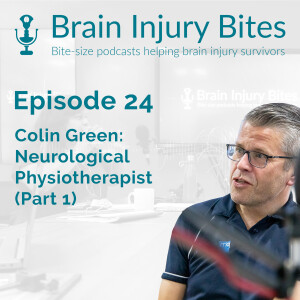
Monday Dec 11, 2023
Monday Dec 11, 2023
In this episode of Brain Injury Bites, Brooke Trotter and Ashwini Kamath speak with neurological physiotherapist Colin Green to explore the realities of long-term rehabilitation after brain injury.
With over three decades of experience and a passion for supporting people beyond the NHS discharge point, Colin shares powerful insights into how physio can support recovery, adaptation, and quality of life, years after injury.
They dive into:
Why brain injury is a lifelong condition and what that means for care
The critical role of community-based neurorehabilitation
What “good” physio looks like for people with cognitive and behavioural challenges
How multidisciplinary teams can unlock better outcomes
Why some recovery plateaus aren’t the end, but a new phase
The importance of tailored, realistic rehab over generic routines
Whether you're navigating recovery yourself, supporting a loved one, or working in the brain injury space, this conversation challenges assumptions and highlights what’s possible when treatment continues beyond the hospital doors.
For a transcript, follow the link below:
Episode Transcript
To keep up to date with our podcast, follow us on our social media accounts:
Twitter
Facebook
Instagram
Contact details:
www.physio-matters.org
Physio Matters Neuro (@PMneurophysio) / X (twitter.com)
Physio Matters Neurological Ltd | Facebook
Contact No.: 0161 681 6887
Community Compass app!
Brain Injury Bites is now part of the Community Compass app! Download now and take the first step toward reclaiming your best life - because you’re not alone in this journey.
Google Play
Apple App Store
Notice:
Information and other content provided in this Podcast should not be taken as providing medical advice or recommendations. Please always consult your doctor or treating team for medical advice.
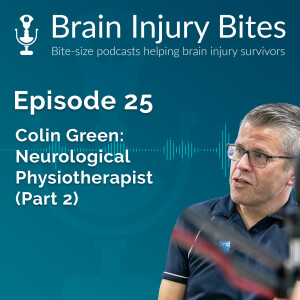
Tuesday Dec 12, 2023
Tuesday Dec 12, 2023
In this follow-up episode of Brain Injury Bites, Brooke Trotter and Ashwini Kamath continue their conversation with neurological physiotherapist Colin Green as they explore the longer-term realities of recovery, motivation and finding movement that works.
Colin unpacks what makes rehabilitation stick beyond the hospital and why success often depends less on routines and more on relationships, creativity and meaning. From support workers to ski slopes, he shares the power of tailored, activity-led rehabilitation in keeping people engaged and progressing.
They discuss:
How poor habits form during the sub acute phase and how to interrupt them early
The role of therapeutic alliance in keeping clients motivated and consistent
Why exercise sheets often fail and what to offer instead
Adaptive sports, functional goals and why enjoyment matters
The emotional challenges of redefining success including life in a wheelchair
Innovative equipment like the AlterG treadmill, Mollii suits and functional electrical stimulation
How to build goals that adapt as clients grow and change
Whether you are in rehabilitation, supporting someone who is or working in neuro care, this episode offers insight, humour and hope with a few lessons about tangerines along the way.
For a transcript, follow the link below:
Episode Transcript
To keep up to date with our podcast, follow us on our social media accounts:
Twitter
Facebook
Instagram
Contact details:
www.physio-matters.org
Physio Matters Neuro (@PMneurophysio) / X (twitter.com)
Physio Matters Neurological Ltd | Facebook
Contact No.: 0161 681 6887
Community Compass app!
Brain Injury Bites is now part of the Community Compass app! Download now and take the first step toward reclaiming your best life - because you’re not alone in this journey.
Google Play
Apple App Store
Notice:
Information and other content provided in this Podcast should not be taken as providing medical advice or recommendations. Please always consult your doctor or treating team for medical advice.
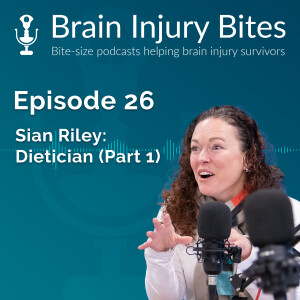
Monday Feb 05, 2024
Monday Feb 05, 2024
In this episode of Brain Injury Bites, Brooke Trotter and Ashwini Kamath continue their conversation with specialist dietitian Sian Riley, delving deeper into the fascinating world of taste, smell, and how brain injury can alter the way we experience food and life.
Sian explains how damage to the brain can affect the senses, particularly smell and taste, which in turn have a huge impact on appetite, nutrition, mental health, and social connection. They also explore safety concerns, emotional well-being and practical solutions like smell training to help people navigate these changes.
They explore:
How smell and flavour are linked to appetite, memory and emotion
Anosmia, parosmia and the strange ways smell can return after injury
The emotional and social impact of losing the enjoyment of food
How smell loss affects safety — from spoiled food to gas leaks
Taste versus flavour — and why food might seem bland or unpleasant
Practical tools like smell training, dietary support and involving family
Whether you are living with a brain injury or supporting someone who is, this episode offers clarity, compassion and tangible advice for adapting to sensory changes and finding joy in food again.
For a transcript, follow the link below:
Episode Transcript
To keep up to date with our podcast, follow us on our social media accounts:
Twitter
Facebook
Instagram
Contact details:
www.redpeppernutrition.com
sian@redpeppernutrition.com
Helpful links:
Fifth Sense Charity - https://www.fifthsense.org.uk/
AbScent Charity - https://abscent.org/
The 5 basic tastes and why they matter to us - https://www.redpeppernutrition.com/wp-content/uploads/2022/01/red-pepper-nutrition-5-basic-tastes-why-they-matter.pdf
Community Compass app!
Brain Injury Bites is now part of the Community Compass app! Download now and take the first step toward reclaiming your best life - because you’re not alone in this journey.
Google Play
Apple App Store
Notice:
Information and other content provided in this Podcast should not be taken as providing medical advice or recommendations. Please always consult your doctor or treating team for medical advice.
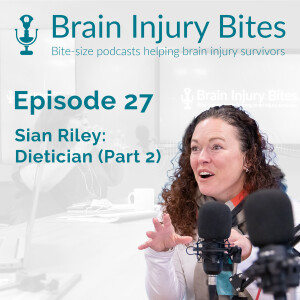
Tuesday Feb 06, 2024
Diet and Brain Recovery (Part 2): Fueling the Healing Process – with Sian Riley
Tuesday Feb 06, 2024
Tuesday Feb 06, 2024
In this episode of Brain Injury Bites, Brooke Trotter and Ashwini Kamath continue their conversation with specialist dietitian Sian Riley, exploring how nutrition, identity and emotional wellbeing are deeply connected after a brain injury.
They discuss how food is more than fuel — it is linked to choice, independence, identity and even grief. Sian explains how brain injury can affect planning, appetite, routine, and body image, and shares how to work with these changes in a compassionate and realistic way. From mindful eating to meal planning, she offers ways to restore joy, autonomy and balance.
They explore:
How food supports not just healing, but independence and confidence
Meal planning, decision fatigue and how routine can reduce overwhelm
Why nutrition should feel achievable, not perfect
The psychological side of eating, including guilt, control and grief
How to approach changes in body image and identity after injury
Supporting long-term health and strength, not just weight
Whether you are recovering from a brain injury or supporting someone who is, this episode offers thoughtful, practical guidance on how to make food a positive and empowering part of life again.
For a transcript, follow the link below:
Episode Transcript
To keep up to date with our podcast, follow us on our social media accounts:
Twitter
Facebook
Instagram
Contact details:
www.redpeppernutrition.com
sian@redpeppernutrition.com
Helpful links:
Fifth Sense Charity - https://www.fifthsense.org.uk/
AbScent Charity - https://abscent.org/
The 5 basic tastes and why they matter to us - https://www.redpeppernutrition.com/wp-content/uploads/2022/01/red-pepper-nutrition-5-basic-tastes-why-they-matter.pdf
Community Compass app!
Brain Injury Bites is now part of the Community Compass app! Download now and take the first step toward reclaiming your best life - because you’re not alone in this journey.
Google Play
Apple App Store
Notice:
Information and other content provided in this Podcast should not be taken as providing medical advice or recommendations. Please always consult your doctor or treating team for medical advice.
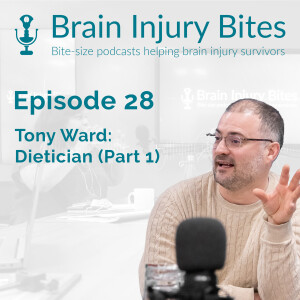
Monday Jul 22, 2024
Monday Jul 22, 2024
In this episode of Brain Injury Bites, Brooke Trotter and Ashwini Kamath are joined by Tony Ward, a specialist dietitian and Director of Neuro Rehab Nutrition, to explore how food, supplements and nutrition play a vital role in brain injury recovery.
Tony shares practical advice on how to meet nutritional needs after brain injury, from boosting vitamin D and managing fatigue, to rebuilding muscle, navigating appetite changes and working closely with occupational therapists. Together, they explore why eating well is not just about nutrients, but about independence, identity and long-term recovery.
They explore:
What nutrients are often lacking after brain injury, and why
The importance of omega-3, antioxidants and balanced meals for healing
Why dietitians focus on food first, and supplements second
How early habits can shape long-term health outcomes
The challenges of creating a healthy diet while maintaining independence
Why emotional investment and choice matter in food and rehab
Whether you are recovering from a brain injury, supporting someone who is, or working in rehabilitation, this episode offers practical insight, thoughtful discussion and accessible guidance for making nutrition part of your recovery journey.
For a transcript, follow the link below:
Episode Transcript
To keep up to date with our podcast, follow us on our social media accounts:
Twitter
Facebook
Instagram
Contact details:
neurorehabnutrition.co.uk
tony@neurorehabnutrition.co.uk
Helpful links:
Food Facts - British Dietetic Association (BDA)
Community Compass app!
Brain Injury Bites is now part of the Community Compass app! Download now and take the first step toward reclaiming your best life - because you’re not alone in this journey.
Google Play
Apple App Store
Notice:
Information and other content provided in this Podcast should not be taken as providing medical advice or recommendations. Please always consult your doctor or treating team for medical advice.
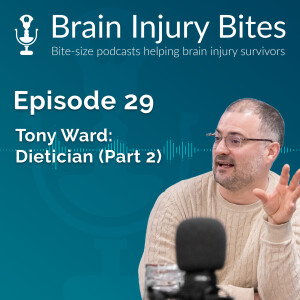
Tuesday Jul 23, 2024
Tuesday Jul 23, 2024
In this episode of Brain Injury Bites, Brooke Trotter and Ashwini Kamath continue their conversation with specialist dietitian Tony Ward, unpacking the myths, fads and emotional factors that influence how people eat after a brain injury.
They explore how food advice online can be confusing or even harmful, and why evidence-based guidance is crucial, especially when nutrition affects mood, memory, energy, and independence. Tony offers a practical, compassionate view of food as both fuel and comfort, and shares how personalised support can help people feel empowered, not restricted.
They explore:
Why social media and diet culture can lead people astray
The emotional side of eating, including grief, stress and comfort food
The gut-brain connection and how probiotics, fibre and variety help
Why frozen veg and simple swaps can make a big difference
Fitting healthy eating into real life, routine and budget
Success stories where balanced nutrition improved energy and well-being
Whether you are recovering from a brain injury or supporting someone who is, this episode offers a down-to-earth, evidence-based look at how food can be a powerful ally in healing and self-care.
For a transcript, follow the link below:
Episode Transcript
To keep up to date with our podcast, follow us on our social media accounts:
Twitter
Facebook
Instagram
Contact details:
neurorehabnutrition.co.uk
tony@neurorehabnutrition.co.uk
Helpful links:
Food Facts - British Dietetic Association (BDA)
Community Compass app!
Brain Injury Bites is now part of the Community Compass app! Download now and take the first step toward reclaiming your best life - because you’re not alone in this journey.
Google Play
Apple App Store
Notice:
Information and other content provided in this Podcast should not be taken as providing medical advice or recommendations. Please always consult your doctor or treating team for medical advice.
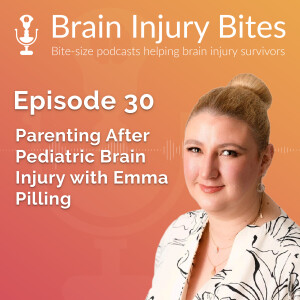
Tuesday Jan 28, 2025
Tuesday Jan 28, 2025
In this episode of Brain Injury Bites, Brooke Trotter and Ashwini Kamath speak with Emma Pilling, a parent navigating the emotional and practical realities of raising a child with an acquired brain injury. Emma shares the story of her son Charlie, who developed hydrocephalus as a baby, and reflects on the impact this had on her family, career and identity.
From the moment of diagnosis to advocating for her son’s education and wellbeing, Emma offers an unflinchingly honest account of the gaps in support, the grief of changed expectations, and the strength it takes to keep going. Now working for the Child Brain Injury Trust, she brings both lived and professional insight into how families can be better supported.
They explore:
What hydrocephalus is and how it can affect the developing brain
The emotional impact of a sudden diagnosis and medical trauma
Parenting through grief, guilt and uncertainty
Being dismissed by professionals and fighting to be heard
The importance of early intervention and trusting your instincts
Finding support, connection and purpose through lived experience
Whether you are a parent, professional or someone living with the effects of brain injury, this episode offers deep empathy, practical wisdom and a call to treat families with the compassion and clarity they deserve.
For a transcript, follow the link below:
Episode Transcript
To keep up to date with our podcast, follow us on our social media accounts:
Twitter
Facebook
Instagram
Community Compass app!
Brain Injury Bites is now part of the Community Compass app! Download now and take the first step toward reclaiming your best life - because you’re not alone in this journey.
Google Play
Apple App Store
Notice:
Information and other content provided in this Podcast should not be taken as providing medical advice or recommendations. Please always consult your doctor or treating team for medical advice.
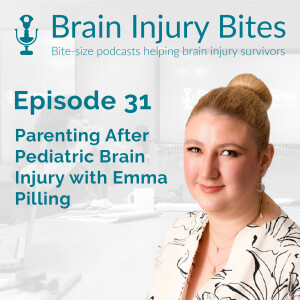
Tuesday Apr 22, 2025
Parenting After Pediatric Brain Injury: Life After Diagnosis – with Emma Pilling
Tuesday Apr 22, 2025
Tuesday Apr 22, 2025
In this episode of Brain Injury Bites, Brooke Trotter and Ashwini Kamath continue their moving and honest conversation with Emma Pilling, whose son Charlie was diagnosed with hydrocephalus and an acquired brain injury as a baby. Now an advocate and fundraiser, Emma shares how diagnosis is only the beginning of a long journey, one shaped by learning, grief, advocacy and extraordinary resilience.
Emma opens up about finding support through the Child Brain Injury Trust, building community through her blog, and the practical changes that make everyday life more accessible. She reflects on the emotional weight of parenting a child with complex needs, and the importance of acceptance, friendship and fighting for the support your child deserves.
They explore:
What real support from charities and professionals can look like
How to advocate for your child in education, healthcare and public spaces
The impact of invisible disability and why awareness still matters
Parenting without comparisons — letting go of milestones and expectations
Finding strength in shared experience and helping others through it
Why peace comes not from giving up, but from being supported to carry on
Whether you are a parent, a professional or simply someone seeking a better understanding of life after childhood brain injury, this episode offers honesty, compassion and the belief that every child deserves more than just a life; they deserve a full one.
Helpful links:
Emma's Blog
Child Brain Injury Trust
Shine Charity
Harry’s Hydrocephalus Awareness Trust
For a transcript, follow the link below:
Episode Transcript
To keep up to date with our podcast, follow us on our social media accounts:
Twitter
Facebook
Instagram
Community Compass app!
Brain Injury Bites is now part of the Community Compass app! Download now and take the first step toward reclaiming your best life - because you’re not alone in this journey.
Google Play
Apple App Store
Notice:
Information and other content provided in this Podcast should not be taken as providing medical advice or recommendations. Please always consult your doctor or treating team for medical advice.










